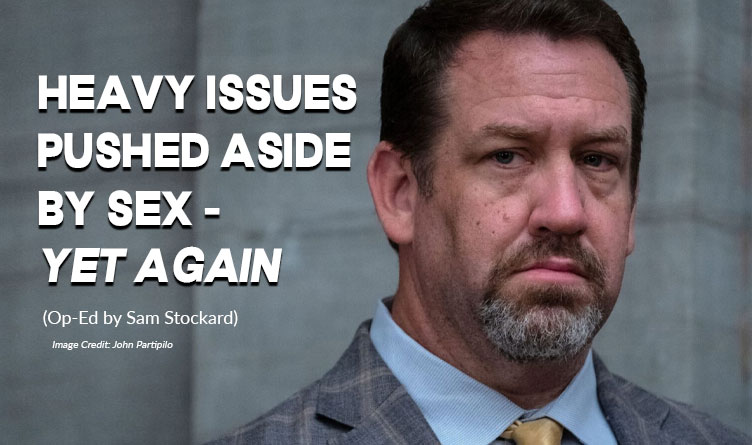Image: Documents handed over by state’s attorneys in an open-records complaint revealed complaints of another sort had been filed against state Rep. Jeremy Faison, a Cosby Republican. Image Credit: John Partipilo
By Sam Stockard [Tennessee Lookout -CC BY-NC-ND 4.0] –
Ah yes, nothing like opening the new year with reports of an alleged sexual harassment complaint, followed by denials, of course. It’s deja vu all over again.
Forget private school vouchers, abortion regulations and transgender issues. It’s all about sex, at least until they start beating each other over the head in the House chamber, where love is not in the air.
The latest hoopla stems from what else? Efforts to cover up wrongdoing, all disguised as attempts to protect victims.

When the House passed rules designed to keep the identities of sexual harassment victims secret after the Jeremy Durham debacle of 2016, it simply set up a method for all details to be hush-hush, including the expense of money to relocate young interns from one apartment to another, making sexual harassment complaints an exception to the state’s Public Records Act.
Thus, when Rep. Scotty Campbell of East Tennessee was found to have harassed an intern last spring, the House hid behind its rules. Only some solid reporting from NewsChannel5 outed the culprits, who spent a decent amount of cash to pay off the young woman and keep her quiet.
Here we are nine months later regurgitating the case because Nashville attorney Brian Manookian had the wherewithal to file a public records lawsuit challenging the state’s refusal to divulge its expenses.
In his initial filing, Manookian sought mainly to find out how much the state spent on the Campbell case. He also asked whether any complaints had been filed against House Republican Caucus Chairman Jeremy Faison by a certain woman.
Manookian later narrowed the scope of his public records questions at the state’s request and didn’t mention Faison the second time around.
In this ruling this week, though, Chancellor Russell Perkins listed the records submitted by the state’s attorneys for an in camera inspection, including: a four-page cover letter marked “HIGHLY CONFIDENTIAL” from the state’s attorneys detailing the envelope’s contents; a blue letter-size folder from Legislative Administration Director Connie Ridley labeled “COMPLAINT 3/17/23” with materials dealing with the Campbell investigation; documents about media inquiries and Ridley’s further engagement with an alleged victim; and a second blue letter-size folder dated April 5, 2023 with “an alleged victim’s first name containing two pages of notes pertaining to a complaint” against Faison; and redacted and non-redacted personnel files of Faison.

Incidentally, Perkins ruled against Manookian’s request to release the financial information, a decision that could be appealed so we could be discussing this thing a year from now. It’s further proof the state’s Public Records Act is fallible.
But back on the judge’s ruling.
House Speaker Cameron Sexton, who just hired a new spokesman this week, issued an X statement Wednesday afternoon, once the news broke, saying, “Contrary to the serious inference included in the order, no complaint has been filed against Chairman Faison.”
Maybe he should have consulted first with Ridley and the state’s outside attorneys with Sherrard Roe Voigt Harbison, who were authorized by Gov. Bill Lee at $375 per hour, before accusing Perkins of lying.
It would be one thing if the House Democratic Caucus had turned over the documents to the court. But in this case, Perkins’ ruling says the state’s attorneys gave that information to the court. All the chancellor did was make note of it – unless he was trying to throw a dog a bone.
And while we’re talking about inferences, the inclusion of two pages of notes pertaining to a complaint about Faison could have come about because Ridley and the attorneys were responding to Manookian’s request for records relating to moving expenses for a legislative intern in 2021, 2022 or 2023 and the judge just included the Faison matter in the ruling because it was part of the package. It could mean the state paid thousands of dollars to move yet another intern.
Perkins was butting up against a deadline to rule or face sanctions amid complaints he was too slow in handling cases. Was this a semi-rush job or did he want to make Faison look bad?
We’ll likely never know because judges aren’t in the habit of explaining their decisions. And at this point we can’t determine whether the Office of Legislative Administration or a House ethics committee looked into the matter because Ridley doesn’t have to give up the information.

It might not be a big deal if Faison hadn’t played a role in Campbell’s banishment. Just two hours after saying he was going to stay in the Legislature in spite of TV reports about the sexual harassment case, Campbell vanished after someone in House leadership told him to go. Sexton and House Majority Leader William Lamberth denied telling him to leave in a post-session press conference that night, but Faison stayed quiet.
Of course, the expense of state money to hide shenanigans is always problematic.
As with most cover-ups, things get worse with time. So we start the 2024 legislative session thinking about more than bills and bull. We have to wonder how far leadership will go to protect one of their own.


About the Author: Sam Stockard is a veteran Tennessee reporter and editor, having written for the Daily News Journal in Murfreesboro, where he served as lead editor when the paper won an award for being the state’s best Sunday newspaper two years in a row. He has led the Capitol Hill bureau for The Daily Memphian. His awards include Best Single Editorial from the Tennessee Press Association. Follow Stockard on Twitter @StockardSam




One Response
Tn. government has always been corrupt and brazen and this is just another example of it. Somehow we keep voting the same creeps in. The “open records” statutes are a joke in this state and what’s that word their so fond of when running for re-election? Oh yeah, transparency. Another joke.